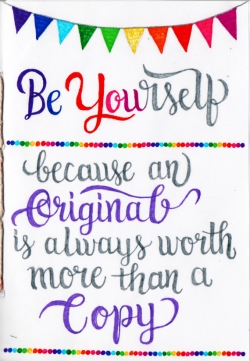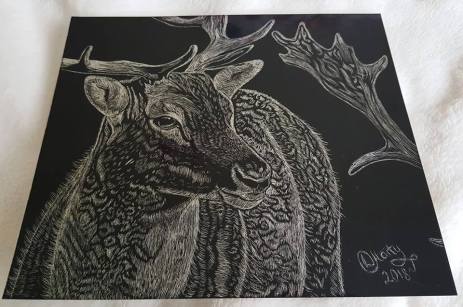
I am breaking a very long hiatus to share a few thoughts about Dissociative Identity Disorder that I think are important for others to understand.
W H A T I S D I S S O C I A T I V E I D E N T I T Y D I S O R D E R ?
I have previously written about Dissociative Identity Disorder on my old blog when the diagnosis was quite new to me. As a short summary, the way I would explain DID in my case is that throughout my childhood I suffered multiple traumatic events. It is as though parts of me got stuck and split off at the ages when these traumatic events occurred. They held onto to the trauma so I could find a way to go on living. Some people who have DID have ‘alters’ – alternative identities with different names, personality traits and histories. This is not my experience. On reflection, I have seen that there was potential for this to happen in my case, but I experience my dissociative parts as younger versions of myself who make up who I am today. Dissociative disorders occur on a spectrum. Everyone’s individual experiences will be different, but no less valid.
D I D I S N O T A G A M E
DID is rooted in trauma. It is not a choice. Speaking from experience, life with DID can be complicated, confusing, disorientating, exhausting, conflicting and isolating. It’s certainly not something that is put on for the fun of it, to make life more interesting, or to make personal gains through. During hospital admissions, I have been accused by some mental health professionals of ‘playing a game’ or ‘messing around’ when I have dissociated into other parts of myself triggered by flashbacks to traumatic events. I would love it if DID was just a game that I could stop playing, or switch off whenever I want to.
D I D I S N O T T H E R E T O E N T E R T A I N O T H E R S
I have found it incredibly difficult at times when people have expressed that they are ‘excited’ to meet, and ‘really want to meet’ other parts of me. I’ve even experienced people seemingly deliberately trying to provoke me to dissociate into another part of me for their own entertainment. I understand how as a phenomenon, DID could be thought of as a really interesting, alternative and even ‘exciting’ way of being. It’s an experience that most people don’t have, so I get that others might be curious and want to at least see it for themselves. However, dissociation happens for a reason. Something has to trigger it, and most of the time it’s traumatic memories or distressing emotions. If I dissociate, that might be the worse and most distressing part of my day. Dissociation is exhausting, confusing and disorientating. It leaves me feeling very vulnerable. Especially if it occurs in front of someone else. I find it quite upsetting and disturbing that someone would be excited at the prospect of me being left feeling like that. Also, when it feels like people are pushing to see other parts of me, it causes my system to clam up, and makes it less likely that they were come out. DID is protective. Many parts of me were born out of traumatic experiences in which others made us do things we didn’t want to, or used and abused us for their own gains. The slightest hint of that dynamic occurring again, and we’re out of here! There are many situations in which it is important in terms of safety for me, the adult part, to remain present. If I don’t dissociate in front of you, I’d try to see it as a positive sign that I am managing the condition well, nothing’s upset me, and I’m feeling safe.
D I D I S N O T A L W A Y S O B V I O U S
I feel there is this stereotype of DID constituting a dramatic existence whereby someone makes several artistic dress changes across a day and is leading multiple extravagant lives with separate sets of friends and relationships. DID can make life feel quite colourful at times, but not that colourful! The truth as I see it, is that most people with DID are just going about their daily business, trying to survive and navigate an existence in a world that can feel very scary and bewildering at times. Most of my closest family and friends have no idea that I have DID and have never even questioned it. Why? Because this is the only way they’ve ever known me, and most people aren’t on the look out for it. DID is a comparatively unknown mental health condition, and is also most likely under-diagnosed. I wasn’t diagnosed until the age of 22. Yet I had lived it my whole life, and had been under mental health services for years. What some people might see as indicating DID is referred to by others as being ‘quirky’, ‘complicated’, ‘complex’, ‘young at heart’, ‘a liar’ even, or just me being Lorna. DID sort of becomes your longest and best kept secret. It’s the bit of you that you feel you have to hide away because it seems so ‘abnormal’ and ‘different’ to other people’s experiences that you find yourself doubting if it’s even true, and you certainly can’t let it show. It actually felt like a really unusual and unsettling experience when DID started coming out in therapy. It became more of a shared experience between me and my therapist, and that felt scary, like breaking a habit of a life time.
D I D I S N O T A W A Y O F E S C A P I N G R E S P O N S I B I L I T Y
This idea has arisen from popular box-sets and true crime series that DID provides a means, or an excuse, to be able to commit horrific crimes under an alternate identity, and then be absolved of all responsibility for them. The reality is that people with DID are far more likely to become the victims of crime than the perpetrator. The idea that DID can be used as a guise to ‘get away with stuff’, no matter how minor, does not sit well with me and my system. It is definitely difficult at times to come to terms with things you have said or done, especially if you have no memory of it, it seems so out of character, and you feel as though you have no control over your life. However, I always take responsibility for the actions and decisions of other parts. Even if it puts me in awkward situations. Even if I have no memory of what happened, feel incredibly embarrassed, or can’t believe what a part of me did. Because my parts make up me, and therefore I have to accept and take overall responsibility for everything done by me, in whatever shape or form. And I can only hope that my honesty and accountability is met by kindness, compassion, and the attempt to understand.
D I D I S N O T S O M E T H I N G T O B E G O T T E N R I D O F
I am often met by this notion, sometimes even by mental health professionals less familiar with the condition, that DID is something that I need to fight, battle and slay in order to become ‘well’, ‘normal’, or a regular, civilised member of society. I don’t see DID as a mental illness, or something that’s wrong with me. I see DID as something that’s right with me. It’s what helped me to survive and achieve all I have done in my life. Integration back into a single identity is held by some to represent the ultimate recovery destination for those with DID, but I suspect it isn’t the one most people who live with the condition are seeking, or would want to. My existence is definitely more integrated than it has been in the past, but it’s not something we find helpful to dwell upon. We see it more as life feeling more manageable. Why would I want to ‘fight off’ or ‘get rid of’ my closest, longest-serving friends who have held my hands every step of the way out of the dark shadows of trauma? I only started to move forwards with my life as a whole when I accepted and embraced having DID. Acceptance, understanding, and open communication is the way forwards for me and my system. Rather than seeing DID as something a person needs to get rid of or fight, encourage teamwork and cooperation between parts.
D I D I S A V E R Y F U N C T I O N A L C O N D I T I O N
The whole point of DID is to survive and find a way to live and function in spite of traumatic experiences. DID makes it easier to compartmentalise different aspects of our lives and store skills, interests and information in separate, but easily accessible places. This element of DID is something I think we can all relate with to some extent. People often talk about needing to put their ‘work head’ on. And the way we behave at work is likely to be quite different to the way we behave at home. Compartmentalising different parts of our lives can make everything feel more manageable and enables us to ‘switch off’ when we need to. DID is at the extreme end of this spectrum, so arguably, it could make us even more functional. People often express surprise when I tell them what I’ve achieved in my life while having DID – school, college, university, employment, living independently etc. – all the ‘ordinary’ stuff! The reality is that people with DID may have high-flying careers, work in services that care for others, they may have families and children, and have every chance of achieving extraordinary things. And most onlookers would never know that underneath the surface, they were navigating complex internal experiences that no one else can see. There is even a psychologist, Dr Jacqui Dillon, who is diagnosed with Dissociative Identity Disorder.
PEOPLE WITH DID CAN LEAD MEANINGFUL AND FULFILLING LIVES WITH SO MUCH INSIGHT TO CONTRIBUTE TO THE LIVES OF OTHERS.
Lorna ♥



